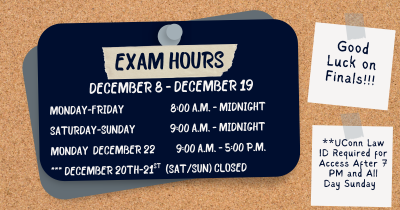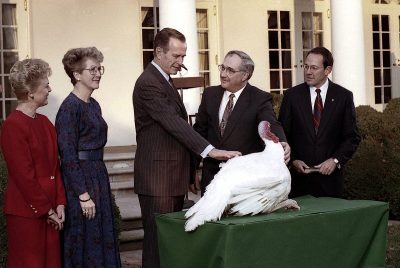The Pocket Part: UConn Law Library Blog
New Club Alert! RECESS: The UConn Law Social Club

Nicole DiBenedetto, Elena Salm, and Christina Clouser
Student organizations play an important role in life at UConn Law. Alongside rigorous academics and professional training, student-led groups create opportunities to build community, foster connection, and support one another beyond the classroom.
RECESS https://www.instagram.com/uconnlawrecess/ is a new organization founded by 2Ls Nicole DiBenedetto, Elena Salm, and Christina Clouser, who wanted to bring more school spirit and community to the law school campus.  Seeing how stressful and isolating law school can be, the founding members created RECESS to give students a chance to connect, unwind, and enjoy campus beyond the books.
Seeing how stressful and isolating law school can be, the founding members created RECESS to give students a chance to connect, unwind, and enjoy campus beyond the books.
The founders of RECESS believe law students deserve a break, an actual recess, from the stress and worries of law school. Their mission is to create a space where students can connect, share interests, and build community off the record. They aim to host 2–3 events each semester that bring joy to campus and give students a chance to step away from the books, recharge, and touch some grass!
RECESS’s next event will take place Tuesday, February 10th at 12:15 – 1:30 in the Library Cafe. Join RECESS preventing burnout, one recess at a time!

Brought to you by the co-founders of RECESS, Nicole DiBenedetto, Elena Salm, and Christina Clouser

Nicole DiBenedetto, Elena Salm, and Christina Clouser
Follow RECESS on Instagram @uconnlawrecess to stay up to date on all events!





Meet Michael Ampofo: A 1L’s Path to Advancing Health Equity

In honor of Black History Month, we’re excited to feature Michael Ampofo, a 1L focused on the intersection of law, public health, and equity. With a background in public health and plans to pursue a dual JD/MPH, Michael brings an interdisciplinary lens to legal education and advocacy. In his own words, he reflects on how the law can shape health outcomes and protect vulnerable communities.
“My name is Michael Ampofo, and I am a 1L from Bristol, Connecticut. I earned my undergraduate degree from the University of Connecticut in 2023 in Allied Health Sciences, with a concentration in Public Health and Health Promotion. My academic experiences sparked an early interest in the structural factors that influence health outcomes and the ways in which legal and policy frameworks can either reinforce or dismantle inequities.
Before beginning law school, I worked with UConn, AmeriCorps, and College Advising Corps as a College and Career Adviser at Bristol Eastern High School from 2023 to 2025. In this role, I assisted high school juniors and seniors with post-secondary planning, including résumé development, career and college exploration, applications to colleges, jobs, and trade schools, and navigating complex financial aid processes such as FAFSA, AACTUS, the CSS Profile, and scholarship applications. This experience strengthened my commitment to advocacy and exposed me to the systemic barriers many students and families face—barriers that often mirror inequities in other institutions, including healthcare.
My decision to attend law school was shaped by my passion for health equity, which developed during my work as an Honors Scholar at UConn. My thesis examined the COVID-19 pandemic’s impact on health disparities, particularly how an overwhelmed healthcare system contributed to increased discrimination by healthcare providers toward Black patients, women, people with obesity, and low-income individuals. Patient experiences highlighted the tangible consequences of discrimination in healthcare and reinforced my belief that legal advocacy and policy reform are essential tools for protecting public health.
Looking ahead, I plan to pair my JD with a Master of Public Health (MPH), focusing on epidemiology and health policy. By combining legal training with public health expertise, I hope to engage in policy development, legislative advocacy, and impact-driven legal work that advances health equity and strengthens protections for marginalized communities.
As a law student, I am motivated by the belief that the law is a powerful mechanism for addressing systemic injustice. Through my legal education, I aim to contribute to solutions that promote equitable health outcomes and ensure that public health considerations remain central to legal and policy decision-making.”
Who Says Insurance Is Boring? The Surprising World of Insurance Fiction
One of the law library’s most unusual collections is its insurance fiction collection. The law library has an extensive insurance collection, covering insurance law practice, risk assessment, historical materials, and materials on the insurance industry. The insurance fiction collection contains works where insurance or people who work in the insurance industry play a role in the plot.
Many books in this collection are mysteries, where insurance is the motive for murder or kidnapping. Insurance investigators are common protagonists, as are detectives. Most books in this collection are mysteries or thrillers, but there are also romance, comedy, science fiction, and fantasy novels. Some books, such as Risk Pool and Mutual Life & Casualty focus less on insurance, but use concepts or roles in the insurance industry as metaphors for characters’ personality traits or relationships.

The law library has been highlighting various collections in celebration of its centennial this year. This month, stop by the display on the main floor to see some of the books in this collection.
Law School, Live on TikTok: Student Blogger Arianna Barker’s Inside Look

My end goal is to become a civil rights attorney who works for marginalized communities. I am heavily inspired by individuals such as Ben Crump and Bryan Stevenson. Moreover, I grew up in a military family, so I have always felt acquainted with public service and justice.

During my time at UConn Law so far, I have experienced and learned a variety of things. In addition to learning about Bluebook citations and diversity jurisdiction, I learned that law school is not the most creative environment, however, it doesn’t have to be this way.

When I was younger, I sang at multiple venues and performed in my school’s plays. I have a huge passion for singing and songwriting that I hope to always keep with me, even as a future lawyer.
I started documenting my life, both inside and outside of law school, on TikTok. TikTok has served as both a creative outlet and a community filled with other law school students across the nation. On top of creating content around my life, I also post singing videos. My biggest video to date, with almost 1.5 million views, is a singing video about the concept of negligence written in the tune of “Irreplaceable” by Beyoncé (my all-time favorite singer!).

Law school inevitably changes you. It forces you to work harder, study longer, and balance life in a new way. As a creative person, I thought law school would eliminate my creativity. Surprisingly, law school has made me even more creative! I hope to be an example of someone who didn’t give up their passions for law school.”
Law School, Live on TikTok: Student Blogger Arianna Barker’s Inside Look


During my time at UConn Law so far, I have experienced and learned a variety of things. In addition to learning about Bluebook citations and diversity jurisdiction, I learned that law school is not the most creative environment. I learned it doesn’t have to be this way.

When I was younger, I sang at multiple venues and performed in my school’s plays. I have a huge passion for singing and songwriting that I hope to always keep with me, even as a future lawyer.

Law school inevitably changes you. It forces you to work harder, study longer, and balance life in a new way. As a creative person, I thought law school would eliminate my creativity. Surprisingly, law school has made me even more creative! I hope to be an example of someone who didn’t give up their passions for law school.”
Laws from New Year’s Past and Present: New Laws Taking Effect in 2026
It's a New Year, which means that more than 20 new Connecticut laws will take effect in whole or in part on Jan. 1, 2026. Laws passed by the legislature have effective dates of July 1, Oct. 1 and Jan. 1 each year, and certain parts of a law can have effective dates at different times. There are a number of laws that became active January 1st, 2026. Law are passed throughout the year at the state capital, but only a handful of the bills signed went into effect immediately. Many kicked in Oct. 1, and more still become active on the first day of 2026.
Check out the latest summaries published by Republican and Democratic legislative offices which together provide a comprehensive picture of the new laws now in force.
If you are interested in what happened before these were passed, check out our research guide which provides step-by-step guide on how to locate legislative history in Connecticut. You can check out a recent blog post featuring Jonathon the Husky's testimony before State Legislature, which is part of legislative history as well! Read here: Advocacy on All Fours - UConn Mascot Jonathon XV's Testimony Before State Legislature.
With these new laws now in effect, the start of 2026 brings fresh developments for legal practice and study. Whether you’re tracking changes in policy or gearing up for the next semester, it’s a perfect time to explore how this year’s legislation will shape the legal landscape.
Happy New Year from UConn Law Library!
See you in ’26! Happy Holidays from UConn Law Library!
Happy Holidays from UConn Law library!
The library will be closed from Tuesday, December 23, 2025 through January 4th, 2026, reopening January 5, 2026. 
Hours
Winter Break
January 5th- Sunday, January 11th
| Monday – Friday | 9:00 a.m. – 5:00 p.m. |
| Saturday & Sunday | Closed |
January Interterm
January 12th – January 18th
| Monday – Thursday | 9:00 a.m. – 7:00 p.m. |
| Friday | 9:00 a.m. – 5:00 p.m. |
| Saturday | 9:00 a.m. – 5:00 p.m. |
| Sunday | 1:00 p.m. – 5:00 p.m.* |
*UConn Law ID required for access after 7PM on weekdays, and all-day Sunday.
Looking forward to seeing you all in 2026!!
Finals Season: We’re Open Longer!
UConn Law Library will be open extended hours during the exam period, December 8th – December 19th.

Exams can be stressful, check out some of our Wellness Resources at the Law Library, and do not hesitate to stop by with any questions about Study Aids, scheduling research consultations or just to chat! We are pulling for you all!
A Century of Coverage: 100 Years of Insurance Law at UConn Law
Insurance law has been a focus of UConn Law School’s curriculum since its founding over 100 years ago. Because of Hartford’s role in the insurance industry, the Hartford College of Law was founded in part to serve the needs of the city’s insurance companies. After the Law School became part of the University of Connecticut in the 1940s, it continued its relationship with Hartford’s insurance industry. 
In the 1990s, the Law School renewed its dedication to being a national center for insurance law and began publishing the Connecticut Insurance Law Journal (now the Insurance Law Review) and established the Insurance Law Center. As the Law School increased its focus on insurance, the library greatly expanded its collections and services in this area, hiring a law librarian specializing in insurance law, Yan Hong. The law library still collects widely in the areas of risk, insurance, and insurance law.
As part of its Centennial Celebration, the law library has a display of materials related to the insurance industry in Hartford and the history of the Law School’s insurance law program.
For a detailed history of insurance law at UConn Law School, see Dean Emeritus Timothy Fisher and Leah Smith’s article Risk and Responsibility: Insurance and the University of Connecticut School of Law.
More information about the library’s insurance collection is available on our research guides.
Pardons Are in the Air: How Presidential Turkey Pardons Became a Thanksgiving Ritual
As Thanksgiving rolls around once again, we’re bringing back a seasonal favorite from the archives—a light-hearted look at presidential turkey pardons and the legal power behind them. Consider this a little blast from the past to pair with your holiday cheer, as we revisit how the nation’s most famous birds earn their moment of executive grace. Enjoy this repost of one of our classic Thanksgiving features!

11/25/1991
It’s that time of year again when the leader of the free world will release another turkey back into the wild. It being Thanksgiving time, we’re talking about birds of course! The history of officially pardoning turkeys doesn’t go back as far as you would think. Yes Truman may have pardoned a bird, but that was for Christmas, and while Reagan spared a turkey named Charlie, he only joked later that it was a pardon. It was George H.W. Bush in 1989 that “officially” pardoned the first thanksgiving turkey. You may be wondering how such awesome power is granted to and exercised by the presidency… Legal research to the rescue!
The power to pardon is granted to the President based on Article II, Section 2 of the United States Constitution which states: “The President . . . shall have power to grant reprieves and pardons for offenses against the United States….” The Office of the Pardon Attorney assists the President in the exercise of the clemency power. The Justice Manual, which provides guidance relevant to the work of the various United States Attorneys’ offices, lists five factors to be considered when determining whether a particular petitioner should be recommended for a pardon. These considerations are: 1) the post-conviction conduct, character, and reputation of the petitioner 2) the seriousness and relative recentness of the offense, 3) any acceptance of responsibility, demonstrated remorse, or attempts at atonement, 4) the need for relief, and 5) any official recommendations or reports submitted, Justice Manual 9-140.112.
According to the Code of Federal Regulations itself though, all of the rules and policy guiding Department of Justice personnel are only advisory in nature and do not restrict the authority granted to the President, 28 C.F.R. § 1.11. In fact, the only steps necessary for a valid pardon are 1) that a president grants it, and 2) that the recipient accepts it, U.S. v. Wilson, 32 U.S. 150 (1833). That means there is no requirement that the pardon be published, although you can find a list of pardons from the Trump administration on the Office of the Pardon Attorney’s website. Conspicuously absent . . . the turkeys.
Let’s hope the President sticks to the script and only pardons another bird this year, so the holiday dinner table is a little easier on us all. And remember, for all your legal research needs feel free to visit us at the reference desk whether bird related or not. Happy Thanksgiving everyone!!!